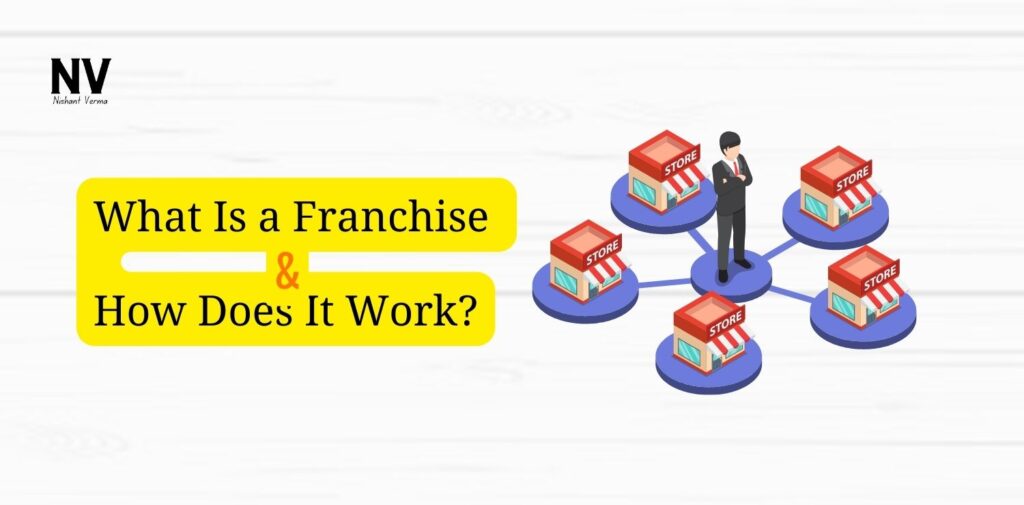Franchises are a way to start your own business with less risk and more support. In this article, we’ll break down what a franchise work is, how it works, and why it can be a good option for aspiring entrepreneurs. We’ll use simple language to make sure you understand all the key concepts.
What is a Franchise?
A franchise is like a partnership between two parties: the franchisor and the franchisee.
- The franchisor: The franchisor is the company that already has a successful business. They offer the rights to their brand, products, and services to others who want to start a similar business. Think of them as the ‘parent company.’
- Franchisee: The franchisee is the person who buys these rights and sets up a new business using the franchisor’s name, products, and business model. They are like the ‘child company’ that operates under the parent company’s rules.
Types of Franchises
There are various types of franchises, but we’ll focus on the two main categories:
- Product and Trademark Franchises: In this type, the franchisee sells products or services using the franchisor’s brand name. For example, fast-food chains like McDonald’s or clothing stores like The Gap fall into this category.
- Business Format Franchises: Here, the franchisee not only uses the franchisor’s brand but also follows their business system. This includes everything from how the business is run to the products or services offered. Examples of business format franchises include Subway, UPS stores, and H&R Block.
How Does a Franchise Work?
Now, let’s dive into the workings of a franchise in a step-by-step manner:
- Step 1: Research
Before becoming a franchisee, you need to do your homework. This includes researching different franchise work opportunities, understanding their requirements, and assessing your skills and financial situation. - Step 2: Choose a Franchise
Once you’ve done your research, you can choose a franchise that aligns with your interests and resources. Make sure it’s a brand you believe in and are excited to represent. - Step 3: Sign the Agreement
When you’ve picked a franchise, you’ll need to sign a franchise agreement. This legal document outlines the terms and conditions of your partnership with the franchisor, including fees, royalties, and the length of the franchise work term. - Step 4: Training
Franchisors often provide training to ensure you understand their business model and how to run it successfully. This may include on-site training, manuals, or online courses. - Step 5: Location
You’ll need to find a suitable location for your franchise. The franchisor might offer guidance on the best locations or even help you secure a spot. - Step 6: Set Up
Once you have your location, you’ll set up your business according to the franchisor’s specifications. This includes the interior design, equipment, and stock. - Step 7: Operations
With everything in place, you can start operating your franchise. You’ll follow the franchisor’s guidelines for running the business, from the menu or product offerings to customer service. - Step 8: Marketing
Franchisors often handle marketing at the national level. They create advertising campaigns and promotions that benefit all franchisees. You might also be responsible for local marketing in your area. - Step 9: Ongoing Support
One of the major benefits of a franchise is the ongoing support from the franchisor. They provide assistance, updates, and training to help you succeed. You’ll also have the chance to network with other franchisees for shared knowledge. - Step 10: Paying Fees
Franchisees typically pay regular fees to the franchisor, which can include:
- Initial Franchise Fee: A one-time payment when you sign the agreement.
- Royalties: Ongoing payments, usually a percentage of your sales, for using the franchisor’s brand and support.
- Marketing Fees: Contributions to the national marketing fund.
Advantages of Owning a Franchise
Owning a franchise offers several advantages, making it a popular choice for budding entrepreneurs:
- Established Brand: You get to benefit from the franchisor’s well-known brand and customer base from day one.
- Support and Training: Franchisors provide training and continuous support, making it easier to run your business successfully.
- Proven Business Model: Franchises are built on successful business models, reducing the risk of failure.
- Marketing Assistance: National marketing campaigns can boost your local business.
- Group Buying Power: Franchisees often enjoy lower costs for supplies due to group buying power.
- Network of Franchisees: You can connect with other franchisees for advice and shared experiences.
Disadvantages of Owning a Franchise Work
While franchises offer many benefits, they also come with some downsides:
- Cost: Initial franchise fees, royalties, and marketing contributions can add up, making it a costly endeavour.
- Limited Independence: Franchisees must follow the franchisor’s rules and may have less freedom to make decisions.
- Competition: You’ll face competition from other franchisees in the same brand, sometimes even in the same area.
- Contractual Obligations: You’re bound by the terms of the franchise agreement, which can be restrictive.
- Royalty Payments: You’ll pay ongoing royalties, which can impact your profits.
How to Choose the Right Franchise
Selecting the right franchise is crucial for your success. Here are some steps to help you make an informed choice:
- Assess Your Interests and Skills: Choose a franchise that aligns with your passions and strengths. If you love food, a restaurant franchise might be a good fit.
- Financial Considerations: Determine your budget and how much you can invest in a franchise. This will help narrow down your options.
- Research Franchise Opportunities: Look into different franchise options. Consider factors like the brand’s reputation, demand for its products or services, and the support it provides.
- Talk to Current Franchisees: Contact existing franchisees to get their insights and experiences. They can provide valuable information about what it’s really like to run that franchise.
- Legal and Financial Review: Have a lawyer and accountant review the franchise agreement to make sure you understand all the terms and financial obligations.
Funding Your Franchise
Starting a franchise work requires a significant investment. There are several ways to fund your venture:
Personal Savings: If you have enough savings, you can use your own money to start the franchise.
- Small Business Loans: Many banks and lending institutions offer loans specifically for starting a franchise.
- Franchisor Financing: Some franchisors offer financing options to help you get started.
- Investors: You can seek out investors who are willing to invest in your franchise in exchange for a share of the profits.
- Crowdfunding: Online crowdfunding platforms allow you to raise money from a large number of people who believe in your business idea.
Legal Aspects of Franchising
Franchising is subject to various legal regulations and requirements to protect both the franchisor and the franchisee:
- Franchise Disclosure Document (FDD): The franchisor is required to provide the FDD to the franchisee, containing important information about the franchise, such as financial statements, fees, and obligations.
- Franchise Agreement: This is the contract that outlines the terms and conditions of the franchise relationship, including fees, royalties, and the length of the franchise term.
- Registration: Some countries and states require franchisors to register their franchises before offering them to potential franchisees.
- Intellectual Property: Franchisees must respect the franchisor’s intellectual property, including trademarks, logos, and trade secrets.
The Lifecycle of a Franchise
A franchise work goes through various stages over time, from the initial setup to growth and potential exit:
- Start-up Phase: You set up the franchise, and it begins operating as a new business.
- Growth Phase: With hard work and following the franchisor’s model, the franchise should grow, attracting more customers and generating more income.
- Maturity Phase: The franchise reaches its peak in terms of profitability and market presence.
- Exit Strategy: At some point, you might consider selling the franchise, passing it on to a family member, or simply exiting the business.
Success Stories
To illustrate the potential of franchising, let’s look at a few success stories:
- McDonald’s Franchise: One of the most iconic fast-food franchises, McDonald’s franchise started as a single restaurant and now has thousands of locations worldwide. Its consistent menu and branding have made it a global sensation.

- Subway Franchise: Known for its customizable sandwiches, Subway franchise is another franchise giant. It allows franchisees to cater to local tastes while maintaining the core brand identity.

- 7-Eleven Franchise: This convenience store chain offers a wide range of products and operates in multiple countries. The 7-Eleven franchise model has allowed it to expand rapidly.

Conclusion
Franchising can be a fantastic way to start your own business with less risk and more support. It’s important to carefully research your options, choose a franchise work that aligns with your interests, and be prepared for the financial commitments. With the right franchise and dedication, you can build a successful business while benefiting from an established brand and ongoing support. Franchising has empowered many individuals to become successful entrepreneurs, and with the right approach, it could be your path to business ownership, too.
Remember, franchising isn’t for everyone, and you should weigh the pros and cons before making a decision. It’s a business model that can lead to great success if it’s the right fit for your goals and resources.




